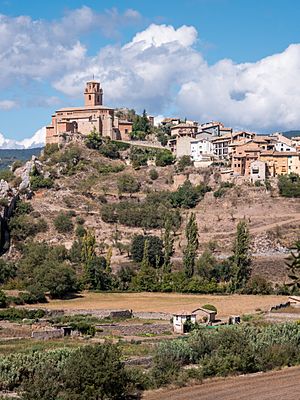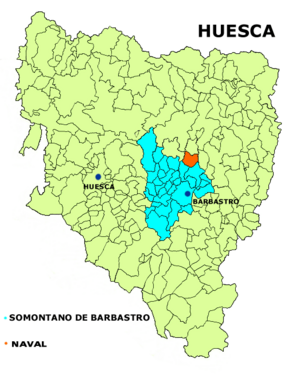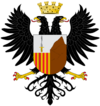Naval, Huesca facts for kids
Quick facts for kids
Naval
|
||
|---|---|---|
 |
||
|
||
 |
||
| Country | ||
| Autonomous community | ||
| Province | Huesca | |
| Comarca | Somontano de Barbastro | |
| Judicial district | Barbastro | |
| Area | ||
| • Total | 47.44 km2 (18.32 sq mi) | |
| Elevation | 631 m (2,070 ft) | |
| Population
(2018)
|
||
| • Total | 269 | |
| • Density | 5.670/km2 (14.686/sq mi) | |
| Demonym(s) | Navales, -a | |
| Time zone | UTC+1 (CET) | |
| • Summer (DST) | UTC+2 (CEST) | |
| Postal code |
22320
|
|
Naval is a small town, called a municipality, in the province of Huesca. This area is part of Aragon in Spain. In 2018, about 269 people lived there.
Contents
Naval has been famous for two main things for a very long time: its pottery and, even more so, its salt flats. Salt flats are areas where salt is collected from salty water.
Salt Flats: A Long History
People have been using the salt flats in Naval for a very long time. They were likely used in ancient times, like the Stone Age, and during the Roman Empire.
In 1099, King Peter I of Aragon took control of Naval. The Muslim people living there gave up the town peacefully. Because of this, the king let them keep their salt works. In return, they had to give him one-fifth of the salt they collected.
Who Owned the Salt?
Over time, parts of the salt flats were passed to other owners. Many of these new owners were monasteries in the area.
In 1274, King James I gave the salt flats a special right. They were the only place allowed to sell salt in a large part of what is now the province of Huesca. For several centuries, the people of Naval continued to work the salt flats.
However, in 1707, King Philip V took over the salt flats. They became part of a royal monopoly, meaning the king's government controlled all salt sales. The original owners did receive money each year as payment.
In 1870, the salt flats were given back to their old owners.
Salt Today
Today, the salt flats are still used to make salt. But they also have something new: several saltwater pools. These pools are open for people to come and bathe in the salty water.
Besides salt, Naval is also known for its pottery. This means people in Naval have a long tradition of making things like pots, dishes, and other items from clay.
See also
 In Spanish: Naval (Huesca) para niños
In Spanish: Naval (Huesca) para niños
 | John T. Biggers |
 | Thomas Blackshear |
 | Mark Bradford |
 | Beverly Buchanan |



